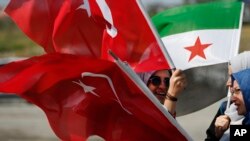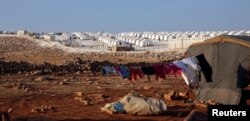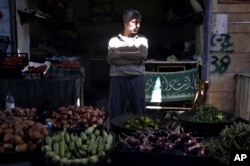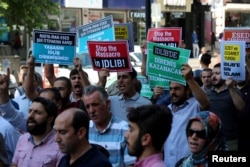Turkey is urging the international community to intervene to prevent Syria from launching an offensive in Syria's last remaining rebel-held Idlib enclave. The latest call for action comes as Syrian government forces mass around Idlib ahead of an expected assault for control of the enclave.
"I call on everyone to raise their voices against the Syrian regime's aggression and find a peaceful solution," Turkish Foreign Minister Mevlut Cavusoglu said Tuesday in Romania, where he held talks with his Romanian and Polish counterparts. His comments echoed recent remarks by Turkish President Recep Tayyip Erdogan.
In an article posted Monday in The Wall Street Journal, Erdogan warned, "The consequences of inaction are immense," and "a regime assault would also create serious humanitarian and security risks for Turkey, the rest of Europe and beyond."
Separately, the head of the U.N. humanitarian agency, Mark Lowcock, has warned that a ground offensive in Idlib could lead to the biggest loss of life this century has seen.
Ankara fears a refugee exodus from the bordering Idlib enclave. Turkey already hosts more than 3 million Syrian refugees, with Erdogan warning that his country can take no more.
More than half of Idlib's refugees are already displaced from other parts of Syria, along with tens of thousands of rebel fighters. Syria, backed by Russia, accuses many of the rebels of belonging to terrorist groups.
Turkish intentions
Ankara is one of the backers of rebels fighting the Syrian government, including groups based in the enclave. Analysts say that along with humanitarian concerns, the survival of Idlib as a rebel base is key to Ankara's broader strategic Syrian goals.
"Turkey needs to hold some portion of Syria and pose a credible threat to [Syrian President Bashar al-]Assad and force Assad into a peace agreement that would accept refugees" to return from Turkey, said political analyst Atilla Yesilada of Global Source Partners. "Keeping parts of Idlib and Afrin and the al-Bab region is a crucial component of this game plan."
In the last 18 months, Turkish-led rebel groups have taken control of the Afrin and al-Bab regions. Ankara justified the cross-border operations to deal with the twin threats of the Islamic State group and the Kurdistan Workers' Party fighters, or PKK. The PKK, which Ankara considers a terrorist group, has been waging a long-running insurgency in southeast Turkey for greater Kurdish rights.
Ankara, however, is concerned that if Idlib were to fall to Syrian government forces, Turkey's broader military presence in Syria would be next in Damascus' sights, according to analysts.
"If Bashar al-Assad secures his power all around Syria, with the exception of those pockets controlled by Turkey, this means we are on a collision course with Damascus," said former Turkish diplomat Aydin Selcen, who served widely in the region.
"What Ankara said about Turkey's operations into Syria is to keep the PKK away from the Turkish borders," he said, adding, "The unsaid objective is to keep Assad far from Turkey's borders."
Given Erdogan's strong support of the Syrian rebels and commitment to bring down the Syrian leader, Ankara fears a victorious Assad could be tempted to extract revenge on Turkey. In the past, Damascus allowed the PKK to use Syria as a base to attack Turkey.
"Turkey's end goal — it wants to create a situation in Syria — is that these neighboring Syria regions to Turkey continue to be controlled by pro-Turkish elements so that there is no security threat to Turkey," said Sinan Ulgen, head of the Turkey-based Edam research institution.
Military buildup
Turkish reinforcements continue their buildup along the border of the Idlib enclave, with long-range artillery among the deployments with a range of 40 kilometers (25 miles). Local reports say some military forces have entered Syria to support 12 Turkish observation posts across the enclave.
"Turkey can resist quite plausibly the Assad regime. Turkey can deal with Assad. Idlib can be defended against the regime," Selcen said.
Other analysts say they are not completely convinced. Soli Ozel, an international relations expert with Istanbul's Kadir Has University, asked how Turkey could "have a war with the Syrian regime, if the Syrian regime is being supported by the Russians to the bitter end, and the Russians control the airspace?"
Russian warplanes are already bombing rebels across Idlib, a bombardment predicted to intensify ahead of the widely expected offensive.
For the past 18 months, Russian President Vladimir Putin has been cultivating a deepening relationship with Erdogan, much to the angst of Turkey's NATO allies. Ankara is likely to be banking that Moscow will be careful to avoid any confrontation in Syria.
"We cannot envisage Russia bombing Turkey's military presence in Idlib," Selcen said.
Analysts suggest Erdogan could be engaging in a high-stakes gamble, betting that Moscow and Damascus aren't ready to risk a clash with Turkey and could yet seek a last-minute diplomatic settlement over Idlib.
Last week, Erdogan met with Putin, along with Iranian President Hassan Rouhani, at a trilateral summit in Tehran. The talks appeared to end in deadlock over efforts to avert conflict in Idlib. Tehran also backs Damascus in Syria's seven-year-old civil war.







